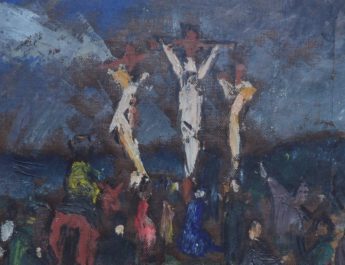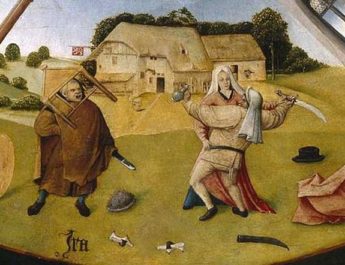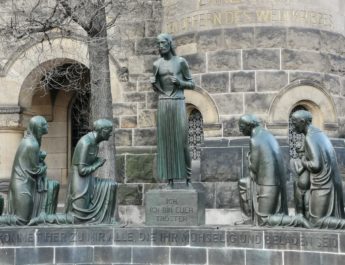1 Corinthians 3:1-9
Ordinary A12
1And so, brothersA and sisters, I couldB not speak to you as spiritual people,C but rather as people of the flesh,D as infantsE in Christ.F
A “brothers” = adelphos. From a (with, community, fellowship) + delphus (womb). This is a brother in a literal or figurative sense. It is also used of another member of the Church.
B “could” = dunamai. This is to be able, have power or ability.
C “spiritual people” = pneumatikos. From pneuma (wind, breath, or ghost; a breeze or blast of air, a breath; figuratively, a spirit, the human soul or the part of us that is rational; also angels, demons, God, and the Holy Spirit); from pneo (to blow, breath, breathe hard). This is spiritual, spiritual people, or spiritual things – that which is ethereal or divine or religious.
D “people of the flesh” = sarkinos. 4x in NT. From sarx (flesh, the body, human nature, materiality, kindred; flesh is not always evil in scripture as when it refer to Jesus taking on a human body; generally used in a negative way for actions made selfishly and not through faith; can mean animal flesh, i.e. meat, or refer to body in contrast to soul/spirit; flesh can be a way of talking about how things or people are related or talking about human frailty physical or moral); perhaps from saroo (to sweep, cleanse by sweeping); from sairo (to brush off). This is fleshly, carnal, physical. It can simply be a way to say human.
E “infants” = nepios. 15x in NT – used in 1 Corinthians 13 (“when I was a child…”). This may be from ne (not) + epos (word; by extension, to speak) {from epo (to answer, bring word, command). This is an infant, child, minor, or immature person. It can also be used figuratively for someone who is childish or unlearned.
F “Christ” = christos. From chrio (consecrate by anointing with oil; often done for prophets, priests, or kings). Literally, the anointed one, Christ. The Greek word for Messiah.
2 I fedG you with milk, not solid food,H for you were not readyI for solid food. Even nowJ you are still not ready, 3 for you are still of the flesh.K
G “fed” = potizo. 15x in NT. From potos (drink or for drinking) OR from pino (to drink literally or figuratively). This is to give to drink, water, furnish, irrigate, or feed.
H “solid food” = broma. 17x in NT. From bibrosko (to eat); related to bora (food); perhaps from bosko (to feed or pasture a flock; figuratively, to nourish spiritually). This is any kind of food in a literal or figurative sense.
I “ready” = dunamai. Same as “could” in v1.
J “now” = nun. This can mean simply now, at the present moment, or immediately. It can also mean now as the logical consequence of what has come before.
K “of the flesh” = sarkikos. Related to “people of the flesh” in v1. 7x in NT. From sarx (see note D above). This is fleshly, earthly, bodily, or relating to material things. It can also refer to acting in a way that typifies human nature – indulging physical desires.
For as long as there is jealousyL and quarrelingM among you, are you not of the flesh, and behaving according to humanN inclinations?O 4 For when one says, “IP belong to Paul,”Q and another, “I belong to Apollos,”R are you not merely human?
L “jealousy” = zelos. 16x in NT – 6x in a positive sense (zeal for God) & 10x in a negative sense (jealousy/strife). Perhaps from zeo (to boil, be hot, ferment, bubble, boil, or glow; used figuratively for being fervent or earnest). This is eagerness or zeal on the one hand or rivalry and jealousy on the other. The verb is meant to echo the sound of boiling water and so it depicts burning emotion that bubbles over. So, burning anger or burning love.
M “quarreling” = eris. 9x in NT. This is strife, contention, quarreling, or debate. It is someone who is ready to fight, who likes to dispute.
N “human” = anthropos. Probably from aner (man, male, husband) + ops (eye, face). This is human, humankind. Used for all genders.
O “inclinations” = peripateo. From peri (about, concerning, around, encompassing) + pateo (to read, trample on; to trample literally or figuratively) [from patos (trodden) OR from paio (to strike, smite, sting; a hit like a single blow)]. This is to walk. Going from Hebrew figurative language, to walk referred to how you conducted your life, how you chose to live. This word is most literally walking around. Figuratively, it is living, behaving, following, how you occupy yourself. This is where “peripatetic” comes from.
P {untranslated} = men. Truly, indeed, in fact. Shows affirmation.
Q “Paul” = Paulos. From Latin Paulus (small, little). This is Paul or Paulos, meaning little.
R “Apollos” = Apollos. 10x in NT. Probably from Apollonios (belonging to Apollo); from the same as apollonia (Apollonia, a Macedonian city); from Apollon (the Greek god Apollo, who was god of “light, music, medicine, poetry, prophecy, dance, manly beauty”); possibly from Pre-Greek (to drive away) OR from apollumi (to destroy) OR apolouon (washing) OR apoluon (delivering) OR haploun (simple) OR aeiballon (always shooting) OR a (not) + polus (parts). This is Apollos. See https://en.wiktionary.org/wiki/Apollo
5 What then is Apollos? What is Paul? ServantsS through whom you came to believe,T as the LordU assigned to each. 6 I planted,V Apollos watered,W but GodX gave the growth.Y 7 So neither the one who plants nor the one who waters is anything, but only God who gives the growth.
S “servants” = diakonos. Perhaps from dia (through, across to the other side, thoroughly) + konis (dust) OR from dioko (to chase after, put to flight; by implication, to persecute or to purse like a hunter after its prey; this can be earnestly pursue or zealously persecute) {related to dio (put to flight)}. This is a servant, minister, waiter, or attendant. It is used for a person who performs a service, including religious service. This is the root of the word “deacon.”
T “believe” = pisteuo. From pistis (faith, faithfulness, belief, trust, confidence; to be persuaded or come to trust); from peitho (to have confidence, urge, be persuaded, agree, assure, believe, have confidence, trust). This is to believe, entrust, have faith it, affirm, have confidence in. This is less to do with a series of beliefs or doctrines that one believes and more to do with faithfulness, loyalty, and fidelity. It is trusting and then acting based on that trust.
U “Lord” = kurios. From kuros (authority, supremacy). This is a respectful address meaning master or sir. It refers to one who has control or power greater than one’s own. So, it was also applied to God and Jesus as Master or Lord.
V “planted” = phuteuo. 11x in NT. From phuton (a plant) OR from the base of phuo (to grow, produce, spring up; perhaps from the sense of puff or blow – to swell up; hence, to germinate; to grow literally or figuratively). This is plant or implant. Figuratively, this word is used for Christian teaching.
W “watered” = potizo. Same as “fed” in v2.
X “God” = theos. From Proto-Indo-European origins, meaning do, put, place. This is God or a god in general.
Y “gave the growth” = auxano. From auksano (to grow or enlarge, whether literal or figurative). This is growing whether in size or mature or greatness or some other metric.
8 The one who plants and the one who waters have a common purpose,Z and each will receive wagesAA according to the laborBB of each. 9 For we are God’s servants, working together;CC you are God’s field,DD God’s building.EE
Z “have a common purpose” = heis + eimi. Literally “are one.”
AA “wages” = misthos. This is wages, pay, or salary. It can also be reward, recompense, or punishment. It is pay for services rendered in a literal or figurative way, either good or bad.
BB “labor” = kopos. 18x in NT. From kopto (to cut, strike, cut off; beating the chest to lament and so to mourn). This is trouble, toil, or labor. This is working to the point of exhaustion or weariness. At base, this refers to a blow that lands so swiftly that one is seriously weakened. Figuratively, this is being greatly tired or working to the point of being without strength.
CC “working together” = sunergos. 13x in NT. From sun (with, together with) + the base of ergon (work, task, deed, labor, effort) {from ergo (to work, accomplish, do)}. This is co-worker, associate, helper, co-laborer or one’s companion during labor.
DD “field” = georgion. Related to “working together” in v9. 1x in NT. From georgos (farmer – one who works the soil) {from ge (earth land, soil, region, country) + ergon (see note CC above)}. This is cultivation, a tilled field, a farm. This is where the name “George” comes from.
EE “building” = oikodome. From oikos (house – the building, the household, the family, descendants; the temple) + doma (house, housetop; often used to refer to the roof) {from demo (to build a house)}. This is the act of building, structure, architecture, a building, up-building. It is a building that is used as a home. Figuratively, this refers to spiritual progress – becoming a person who is a better home in which God can reside.
Image Credit: “Tree of Hope” by Julie Leuthold, 2013.




